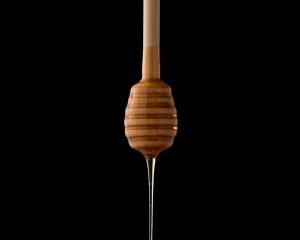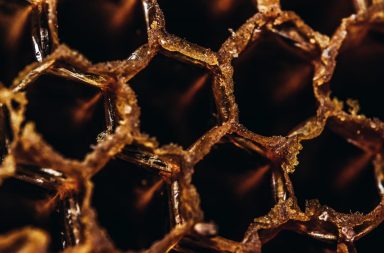Manuka honey has been hailed as nature’s miracle for its numerous healing properties and health benefits. This golden, sticky substance can be used to treat wounds, moisturise hair and may even relieve symptoms of asthma! If Manuka honey can be used for such a variety of treatments, we can’t help but wonder – is Manuka honey acidic or alkaline?
Manuka honey: benefits for asthma
This special variety of honey has been growing in popularity, and whilst it originates in New Zealand, you can find Manuka honey in almost all health stores.
You may be wondering, how can Manuka honey treat so many different ailments? Well, you aren’t the first to ask this question!
So, we’re going to look into the science of Manuka honey, and find out how this natural medicine works its magic. We’ll also answer the question – is Manuka honey acidic or alkaline?
What is Manuka honey?
Unlike your average garden-variety honey, Manuka honey is a rare variety of honey produced in New Zealand.
Manuka honey comes from the pollination of the Manuka plant, which is indigenous to New Zealand, and until recently, was only found on this pacific island.
Producers of honey in the US and the UK now also have strains of this plant and can produce the honey themselves, however it is still a rare and expensive honey to produce!
But what makes Manuka honey so rare?
Well, it’s a good question!

Photo credit: Mau Mu via Unplash
The Manuka plant blossoms for only a couple of months in a year. This means bees are only able to pollinate the plant and produce the honey for a brief period of time.
Of course, this makes the honey extremely difficult to produce in great quantities. Unfortunately, for lovers of this indulgent product – it tends to put the price tag up quite high!
So, if Manuka honey is produced in the same way as garden honey, why does it have healing properties?
Well, we’re going to tell you!
How does Manuka honey benefit healing?
So, this delicious sticky, substance is used to heal cuts and scrapes by topical application. But how does it do it?
Well, first let’s look at why Manuka honey has these healing properties, and it all starts with the production of the honey.
The Manuka plant, from which this rare honey is produced, has an incredible amount of beneficial properties. These include antiviral, anti-inflammatory, anti-biotic and even antiseptic.
Of course, when bees pollinate the Manuka plant, and collect the nectar, all these properties are picked up too. So, when the bees produce the honey, they are all present in the finished product!
Manuka honey really is a miracle of nature!
But that still doesn’t answer how the honey is able to heal wounds. And is Manuka honey acidic or alkaline?
Let’s talk about how Manuka honey aids healing.
The Manuka honey that is traditionally used for healing wounds is different from the Manuka honey you add to your hot tea! In fact, it is a special variety of active Manuka honey, and is specifically labelled as medical-grade.
What’s the difference?
Well, active medical-grade Manuka honey contains active enzymes, reported to increase the rate in which skin and tissue can regenerate. These enzymes clear dead skin cells, and stimulate growth of new blood capillaries and collagen fibres – pretty amazing!
Of course, the anti-bacterial properties also aid healing and prevent infectious bacteria developing in the wounds!

Photo credit: Vivek Doshi via Unsplash
So, is Manuka acidic or alkaline? And how does this benefit the healing properties?
Let’s find out!
Is Manuka honey acidic or alkaline?
It might surprise you to know that Manuka honey is actually acidic!
In fact, Manuka honey has a PH level between 3.4 and 4.5 – as do most varieties of honey! This level of acidity is actually what promotes the healing properties of Manuka honey.
So, when we talked about the enzymes clearing dead skin cells to stimulate the growth of new tissue and blood capillaries – the acidity levels found in Manuka honey actually block negative enzymes to make room for the good!
Manuka honey actually contains a number of different acids that make up the PH level, including organic acids, amino acids and aromatic acids.
Interestingly, the aromatic acids found in Manuka honey actually contribute to the distinct flavour that the honey has!
Of course, the acidity levels and healing benefits of Manuka honey don’t only treat wounds, cuts, and scrapes. In actual fact, Manuka honey is used to treat a huge number of ailments!
Let’s take a look at what else Manuka honey is used for!
How else do we use Manuka honey?
One of the reasons Manuka honey has become such a popular alternative medicine is because of its versatility. Unsurprisingly, the list of uses for Manuka honey is almost endless!
Well, we’re not going to list every possible use for Manuka honey. But we are going to look at the most popular ways in which Manuka honey can be used – including as a natural medicine and a beauty product!
Skin care
Did you know that Manuka honey can give you brighter skin? Well, it can! You can use Manuka honey as a cleanser, or as a face mask for brighter and softer skin!
How to: use Manuka honey for brighter skin
Not only that, but if you apply Manuka honey topically to pimples and acne, the anti-inflammatory and antibacterial properties will clear up blemishes and calm redness in no time!
Hair care
Yes, another popular use for Manuka honey is as part of your hair care routine.
Why? Well, the properties in Manuka honey can provide deep conditioning treatment for your locks! Particularly when applied as a hair mask.
How to: make a DIY Manuka honey hair mask
In fact, Manuka honey may reduce split ends, and can even soothe dry and itchy scalps!

Photo credit: Dmitry Grigoriev via Unsplash
Acid reflux and stomach ailments
So, we know Manuka honey is acidic. Well, the acidity in this deliciously sweet substance might actually benefit those that suffer from acid reflux! Yes, the stickiness of Manuka honey can coat the lining of the esophagus if ingested, which will help prevent direct contact with the acid if acid reflux is triggered!
Not only that, but the acidity and antibacterial properties in Manuka honey might also be able to relieve a number of stomach ailments, including gastritis, digestion troubles and even bloating!
To use Manuka honey for these ailments, it can be taken on a teaspoon each day. You could also take Manuka honey in your tea, or on breakfast pancakes or cereal – delicious!
So, we now know that Manuka honey is acidic, and that these acidic properties add to the health benefits and uses of this incredible natural product.
Manuka honey has been used for centuries in native New Zealand, and it is clear that this natural sweetener is certainly gaining popularity in the world of alternative medicine and natural beauty! And with such a long list of uses, it’s certainly not hard to see why!


